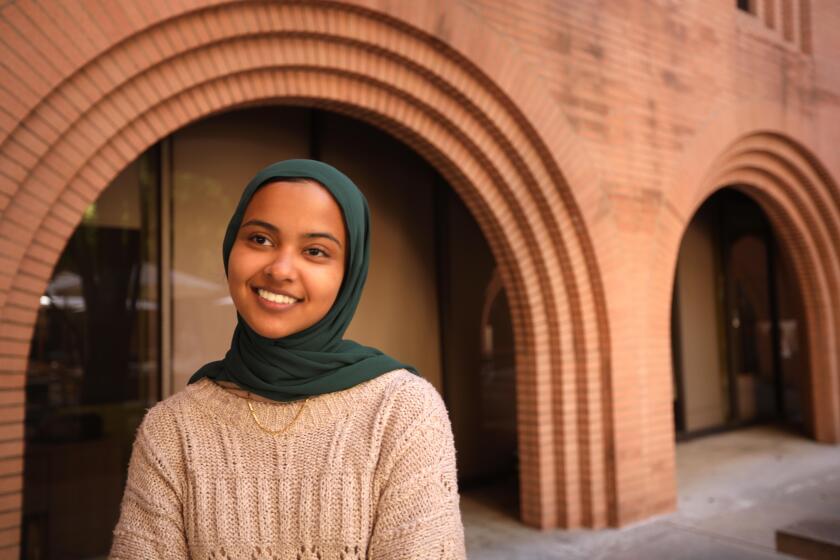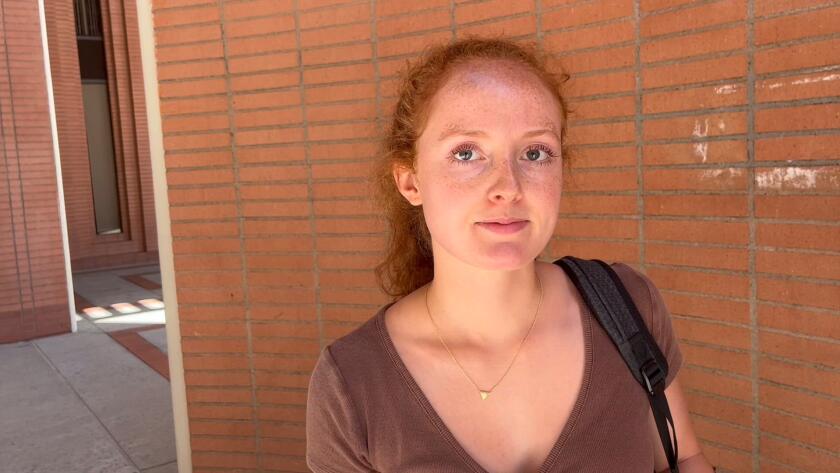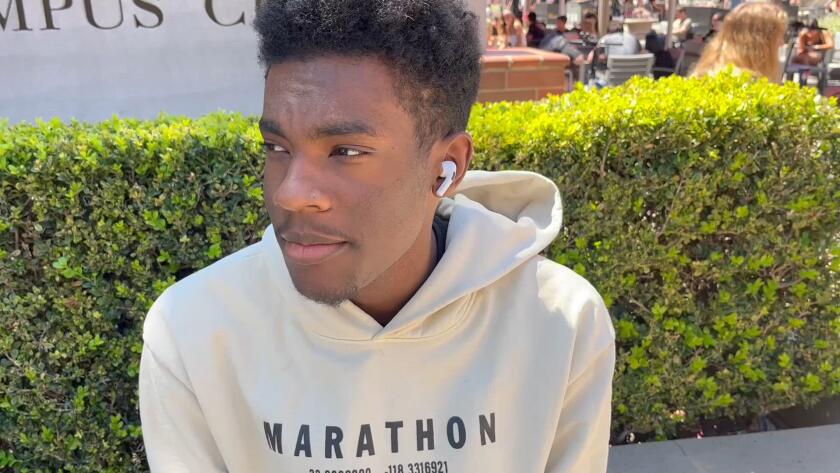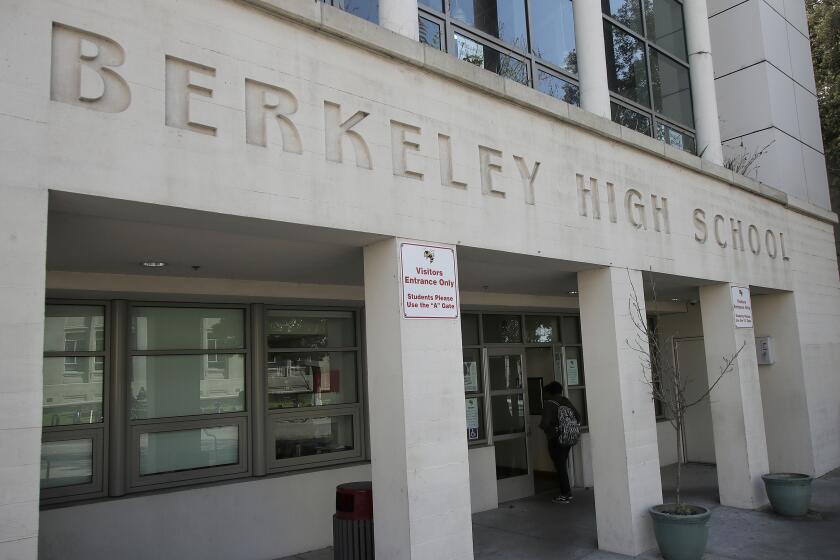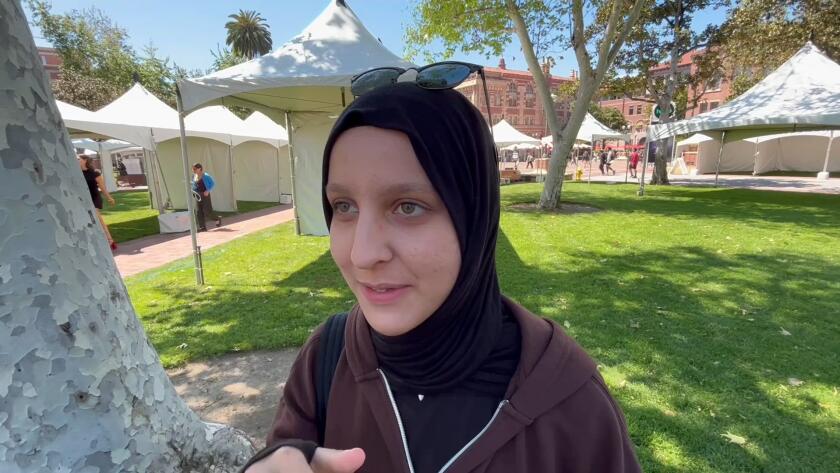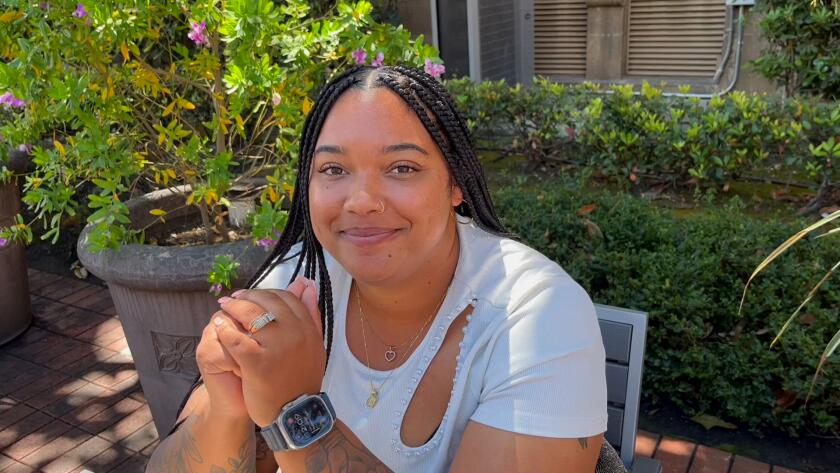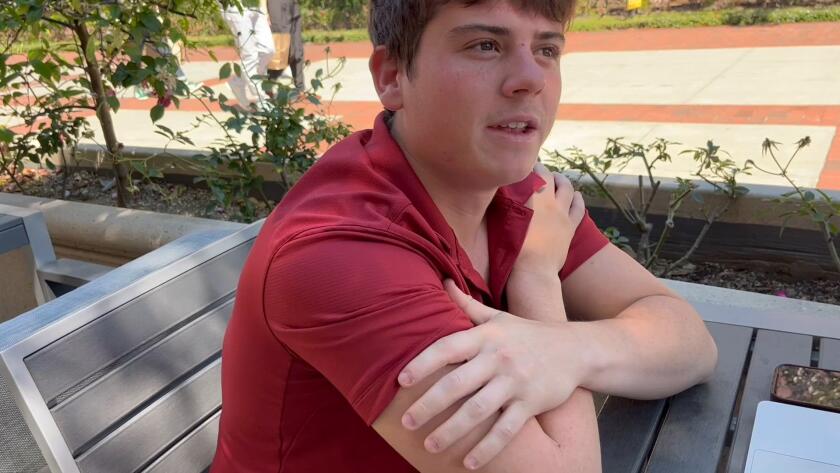‘Let her speak!’ USC campus reels after valedictorian’s speech is canceled

- Share via
When they canceled a graduation speech by a pro-Palestinian valedictorian, USC officials intended to cool down tensions that have roiled the campus throughout the Israel-Hamas war.
Instead, the decision by President Carol Folt to revoke a speaking slot for the valedictorian ignited more controversy and catapulted the university further into debates over student activism, free speech, antisemitism and anti-Muslim and anti-Arab hate.
On Wednesday, a smattering of protesters gathered by the landmark Tommy Trojan statue, some calling on Folt to reverse course as arguments broke out between those on opposing sides.
Asna Tabassum was selected as USC valedictorian and offered a slot to speak at graduation. The university canceled her speech after pro-Israel groups criticized her Instagram.
Dozens of student groups have signed a letter to administrators, saying they are “outraged and ashamed” at the university, which defended the cancellation by citing unspecified threats to campus safety. In another plea, more than 130 faculty members signed a letter to Folt, saying her move “stifles open communication.”
USC senior Caroline Ash, 22, is a global health major. (Genaro Molina / Los Angeles Times)
Some students are planning a “silent march” for Thursday afternoon, when they will don masks and hoodies to express their view that Asna Tabassum, the valedictorian who says the university has “abandoned” her, is being silenced.
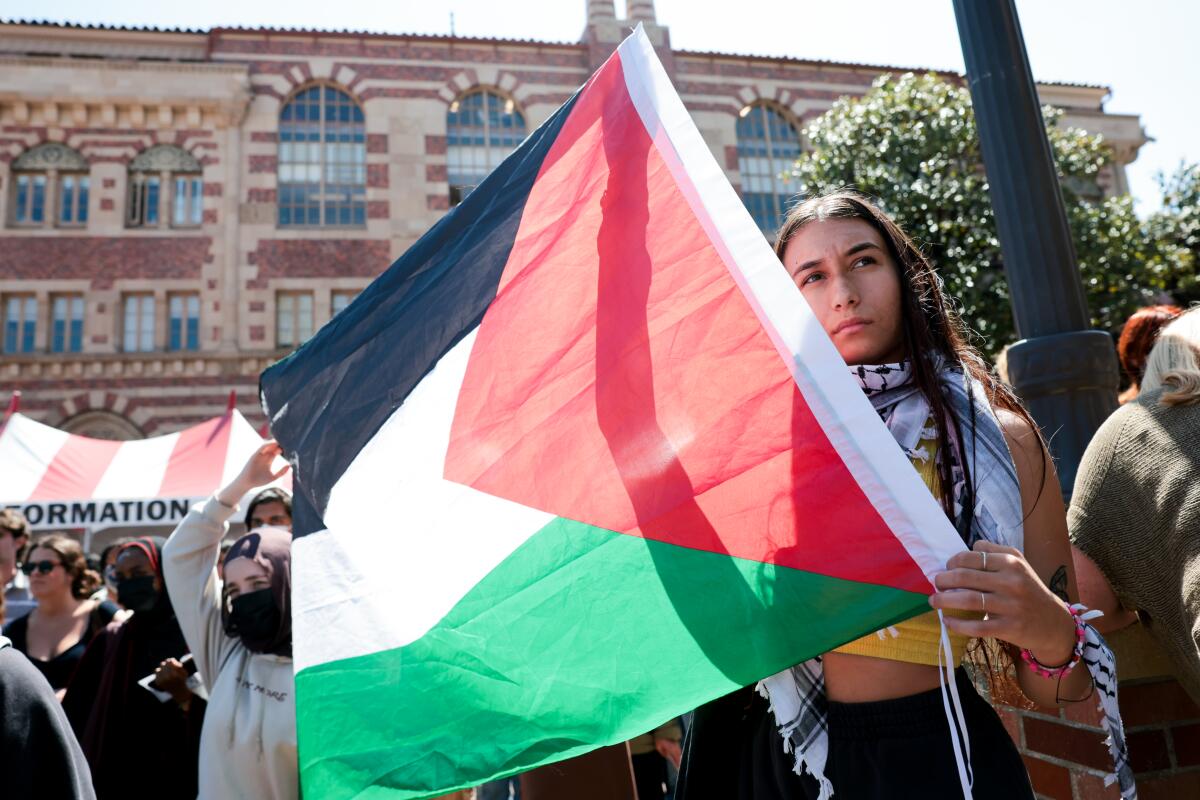
“I’ve been here 24 years,” said Rabbi Dov Wagner, who leads the Chabad Jewish center at USC and is among those who have taken offense at the university’s selection of Tabassum as valedictorian. “It has never been this tense.”
Before the controversy erupted, the sole public indication of Tabassum’s political beliefs was a link to a pro-Palestinian website on her Instagram profile. But pro-Israel groups labeled her antisemitic because of anti-Israel content on the site and said she should not be allowed to speak at the graduation, or that she should not have been named valedictorian.
Folt has not spoken publicly about the decision to cancel Tabassum’s speech. Provost Andrew Guzman, speaking Wednesday to a monthly Academic Senate faculty meeting, said that the decision was not the administration’s “first choice” but that he had “a high degree of comfort” with it, the student-run news site Annenberg Media reported.
The university has referred questions about security to Erroll Southers, USC’s associate senior vice president for safety and risk assurance. Southers declined an interview request on Wednesday.
USC freshman Kailen Hicks, 18, is a journalism major. ( Genaro Molina / Los Angeles Times)
Responding to questions about whether USC has reported commencement-related threats to police, Los Angeles police spokeswoman Capt. Kelly Muniz said the department “does not have a crime report or additional insight into this matter.”
University officials chose Tabassum, a biomedical engineering major with a minor in resistance to genocide, as valedictorian from a pool of nearly 100 applicants with GPAs of 3.98 or above. The title comes with an invitation to deliver a 3-to-5-minute speech to an audience of about 65,000 at the campuswide commencement ceremony on May 10.
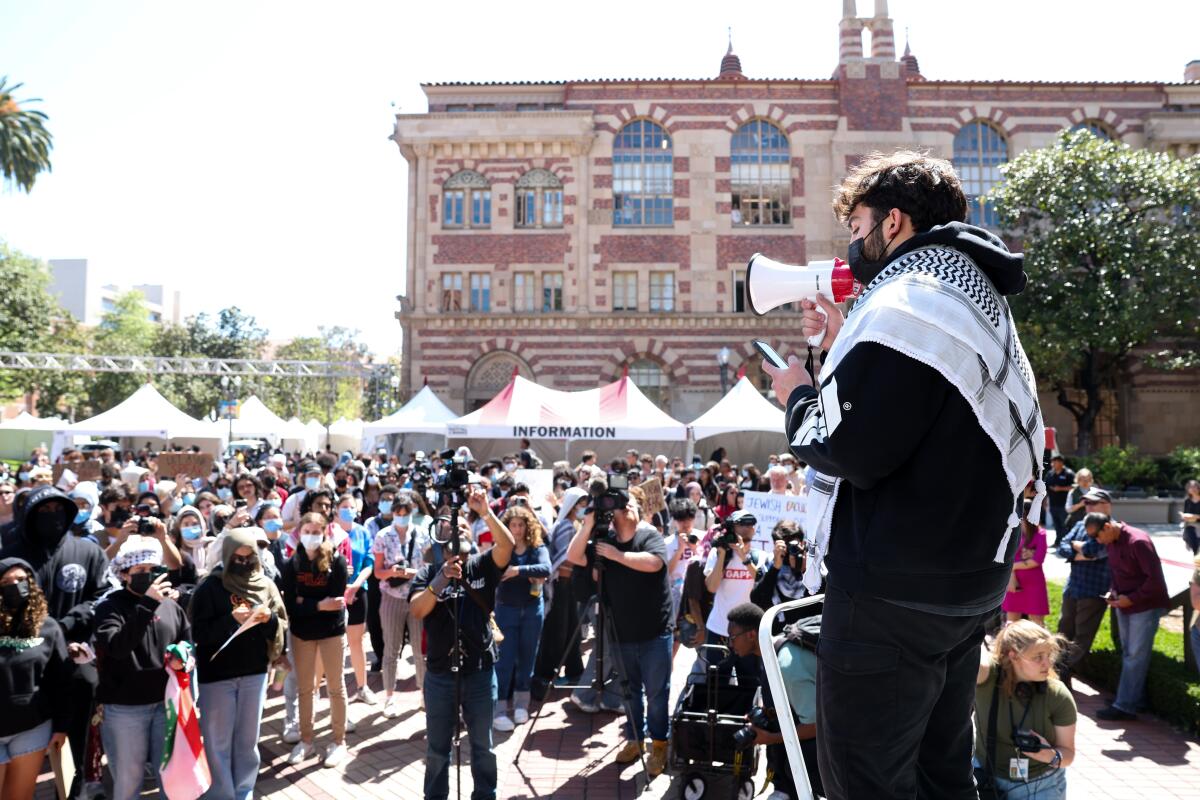
The website linked on Tabassum’s Instagram page says that “Zionism is a racist settler-colonialist ideology” and that the movement’s founders believed “Palestinians needed to be ethnically cleansed.” It also says that “one Palestinian state would mean Palestinian liberation and the complete abolishment of the state of Israel” so that “both Arabs and Jews can live together.”
Tabassum has declined to denounce the website’s content but told The Times that she is not antisemitic. She said she has not been a prominent pro-Palestinian activist and accused the university of singling her out as a hijab-wearing Muslim woman.
Enikia Ford Morthel, the superintendent of Berkeley Unified School District, will testify in May in front of a congressional committee on charges of antisemitism in her schools.
“When you silence us, you make us louder,” she said in an interview Tuesday.
Divisions over the cancellation were apparent on campus Wednesday afternoon as Brent Blair, a theater professor, stood by the Tommy Trojan statue holding a poster that said, “Jewish faculty in support of Asna Tabassum. Let her speak!”
As students passed by, some took photos of Blair — who wore a yarmulke and a Star of David necklace — to express support.
But another student saw Blair, shook his hand and told the professor he was Jewish.
USC freshman Fatima Cicek, 18, is a neuroscience major. (Genaro Molina / Los Angeles Times)
“I don’t think she should speak,” said the student, who declined to share his name.
The student said Tabassum promoted antisemitism and it would have been dangerous to let her talk at commencement.
“I have a lot of Jewish friends who are scared that she will speak,” the student said.
“I have a lot of Jewish friends who are scared she won’t,” Blair said in response.
Another student walked by and looked over his shoulder at Blair’s sign. “You’re a sad Jew,” he said.
Reflecting on the exchange, which a reporter from The Times witnessed, Blair said the university has further inflamed campus divisions.
“If USC wanted to create a mountain of resentment, they couldn’t have done anything more efficient,” he said.
A group called the Revolutionary Communist organization, made up of non-students, was also present on campus Wednesday. Members held signs saying Tabassum “must be heard” and “stop the repression of pro-Palestinian voices.” They handed out pro-Palestinian fliers, including to student Jade Li.
Li, a third-year neuroscience major, said canceling the speech was “messed up.” She said she had not discussed the issue in her classes or in conversations among friends and felt the need to “be doing more.”
Moustafa El-Mahdy, a graduate student who was passing by, also said he disagreed with the decision.
“She is being silenced, not based on what she was going to say, but what they were scared she would say,” he said.
USC doctoral candidate Shawntae Mitchum, 29, is a sociology major. (Genaro Molina / Los Angeles Times)
Tabassum, who said she had not written her speech or shared details about it with the university, said she had planned to focus her talk on “hope.”
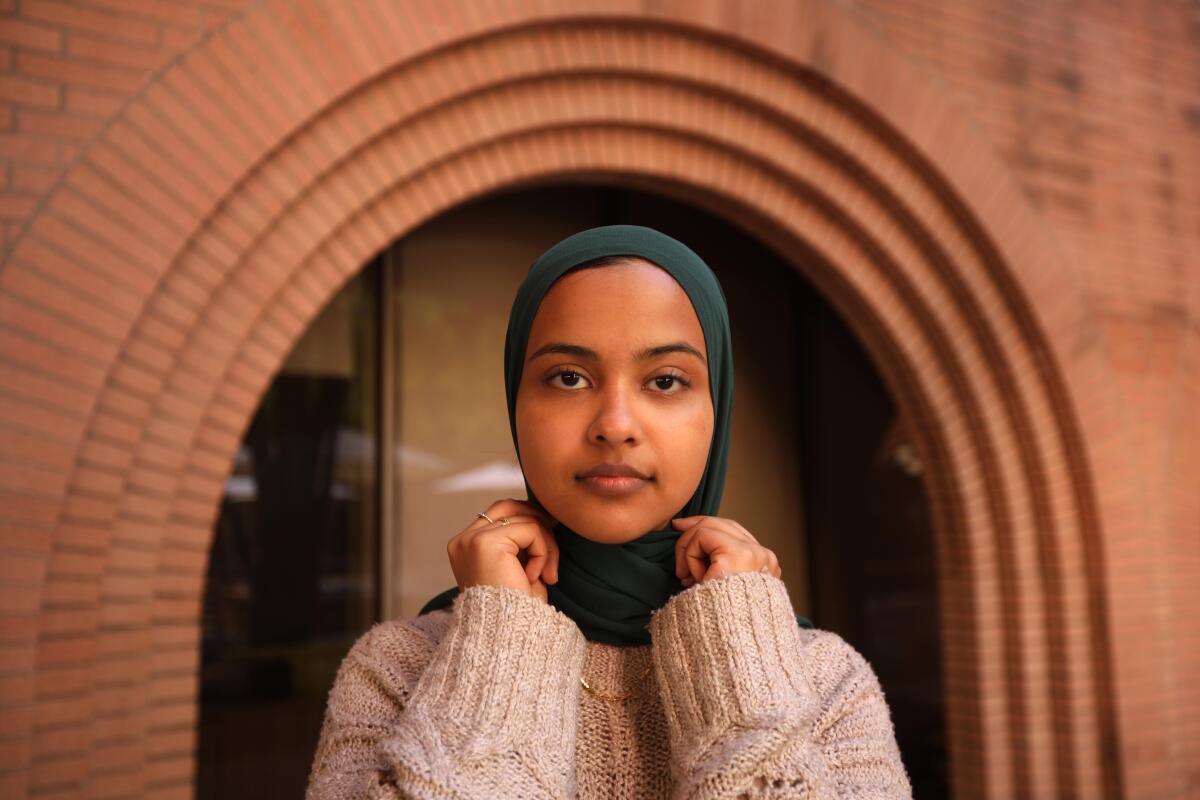
Pro-Israel organizations from outside USC were among those that issued the loudest calls for Tabassum to be disinvited. But some pro-Israel Jewish groups on campus have also been critical of the university.
“The university has failed to condemn the antisemitic rhetoric propagated by the valedictorian,” the student group Trojans for Israel said in a statement.
Wagner, the rabbi who leads Chabad, a campus organization that does outreach to its several thousand Jewish students, said he agreed with that sentiment.
USC junior Ethan Stubington, 21, is studying law. (Genaro Molina / Los Angeles Times)
“USC was in an impossible situation where there was not any good path forward,” said Wagner, adding that he respected the student’s academic achievements but disagreed with the views she had linked to online about the Israeli-Palestinian conflict.
Still, he said, USC had “mishandled” the controversy.
“It’s unfair to everyone.”
More to Read
Sign up for Essential California
The most important California stories and recommendations in your inbox every morning.
You may occasionally receive promotional content from the Los Angeles Times.
